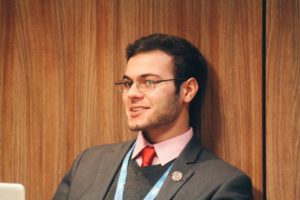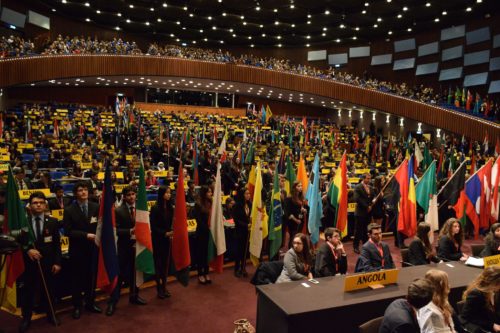This guest article was provided by Felipe Félix Méndez, a junior at the International School of Panama.

The author, Felipe Félix Méndez
I was skeptical. Although I wanted to believe that I would have tried my best without the possibility of winning an award, I struggled to picture a group of young men and women discussing global issues without a competitive incentive. “The conference is the prize,” they said, and I continued to doubt the extent to which 4,000 students could possibly agree with that statement. Now, in the wake of what is humorously known as PTD (post-THIMUN depression), the chair stands corrected.
Last month at THIMUN, I had the pleasure of serving as Deputy President of the Security Council. In just a few days, a MUNer with almost 4 years of experience like me, came to question everything he thought he knew about this activity. As a student who has participated in mostly Panamanian, Latin American and American MUN conferences, all of which share the concept of awards, I have always advocated for the idea that the chair is simply a facilitator applying procedure, leaving the responsibility of leading the committee to delegates. Before the conference, I would have argued that it is the chair’s duty to engage with delegates in the most unbiased way possible, in order to avoid compromising his or her objective position when choosing award winners. Contrastingly, my understanding of chairing has changed dramatically as a result of being exposed to THIMUN.

THIMUN taught me that having an entire committee of passionate students is an opportunity that one must embrace. If we think about it, we are rarely faced with a group of people who are keen on achieving a common goal, and look up to us in order to guide them to success. With features such as individual lobbying periods for each issue and permanent member caucuses, the Security Council allows chairs to collaborate with delegates and steer them in the best interest of the international community. I have come to understand that it is a chair’s duty to motivate delegates to become the best versions of themselves, and to join the discussion on global issues. This is THIMUN’s doctrine when it comes to chairing.
Gazing at thousands of passionate students from the stage of the impeccable World Forum theater, I finally understood the magnitude of what we had achieved after a week of intense debate. This was the rightful closure for a week marked by insightful conversations such as those shared with my fellow student officers over dinner. We discussed matters as deep as identity and the politics of our home countries simply because we truly care about them and enjoy meeting others who do too. I concluded that THIMUN is a microcosm of the vision that many high school students would like for the world as a whole – one in which leaders empower society at large to solve the issues that we face. I am extremely grateful to everyone involved in THIMUN, as well as the International School of Panama, for turning this illusion into a surreal week surrounded by the some of the brightest young minds in the world. I look forward to bringing these ideas to others, back home and elsewhere!
About the Author:
Felipe Félix Méndez is a junior at the International School of Panama. This Panamanian-Uruguayan student has been involved in MUN, Model OAS, and debate for the past four years. He has served as the first-ever President of the General Assembly in the Secretariat of the 24th Edition of the Panama Model United Nations (PANAMUN), the oldest and largest MUN conference in Central America, as well as being a chair at other conferences in his home country. Felipe has also participated in several conferences both locally and internationally, including the Harvard Association Cultivating Inter-American Democracy and Boston College’s EagleMUNC.

